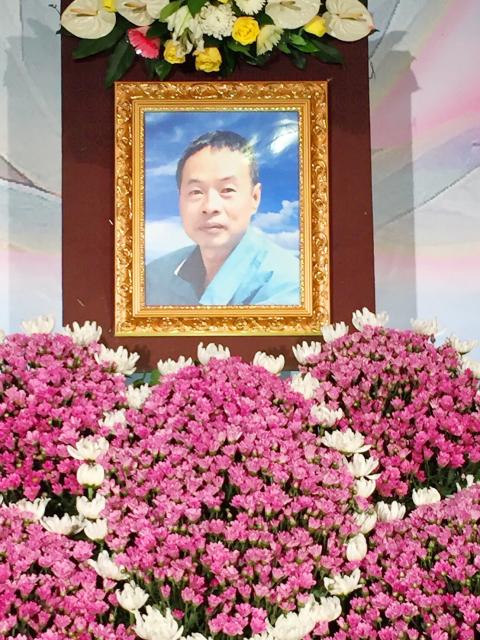The driver of a tour bus that crashed and caught fire in Taoyuan, killing all on board, was drunk when the accident happened, prosecutors said yesterday.
In the worst road accident ever to hit Chinese visitors to Taiwan, an entire tour group of 24 died when their bus was engulfed in flames and rammed through a freeway barrier last week.
Tests on the remains of the driver — who died in the crash, alongside a Taiwanese tour guide — found an alcohol concentration of 1.075 milligrams per liter (mg/L), prosecutors said in a statement.

Photo: Chou Min-hung, Taipei Times
That put the driver, Su Ming-cheng (蘇明成), at more than four times the legal limit of 0.25mg/L.
“He was drunk driving — a very severe case of drunk driving,” Taoyuan District Prosecutor Wang Yi-wen (王以文) said.
The discovery means the probe is to focus more on the driver’s mental and physical state, he added.
Prosecutors are delving into Su’s habits, diet and social circle to determine why he might have been driving over the legal limit, Wang said.
Tests did not find any traces of drugs or sedatives in his system, the statement said.
Prosecutors have already said that five bottles of gasoline were found on the bus, despite regulations banning inflammable substances in vehicles.
Prosecutors have searched the driver’s home twice, and questioned his relatives and coworkers.
Local media reports said that Su, the main breadwinner in his family, struggled financially and interacted little with his colleagues.
The bus carrying the tourists from Dalian, China, was heading to Taiwan Taoyuan International Airport on Tuesday last week after the group had completed an eight-day trip to the nation.
Distraught relatives who came to Taiwan to identify the bodies of the victims questioned why none of them were able to escape through the emergency exits when the fire ripped through the bus.
One eyewitness said trapped passengers inside the bus had been pounding on the windows as it careered off the road.
Officials in Beijing have demanded that Taiwan take measures to ensure the safety of Chinese visitors.

A Ministry of Foreign Affairs official yesterday said that a delegation that visited China for an APEC meeting did not receive any kind of treatment that downgraded Taiwan’s sovereignty. Department of International Organizations Director-General Jonathan Sun (孫儉元) said that he and a group of ministry officials visited Shenzhen, China, to attend the APEC Informal Senior Officials’ Meeting last month. The trip went “smoothly and safely” for all Taiwanese delegates, as the Chinese side arranged the trip in accordance with long-standing practices, Sun said at the ministry’s weekly briefing. The Taiwanese group did not encounter any political suppression, he said. Sun made the remarks when

The Taiwanese passport ranked 33rd in a global listing of passports by convenience this month, rising three places from last month’s ranking, but matching its position in January last year. The Henley Passport Index, an international ranking of passports by the number of designations its holder can travel to without a visa, showed that the Taiwan passport enables holders to travel to 139 countries and territories without a visa. Singapore’s passport was ranked the most powerful with visa-free access to 192 destinations out of 227, according to the index published on Tuesday by UK-based migration investment consultancy firm Henley and Partners. Japan’s and

BROAD AGREEMENT: The two are nearing a trade deal to reduce Taiwan’s tariff to 15% and a commitment for TSMC to build five more fabs, a ‘New York Times’ report said Taiwan and the US have reached a broad consensus on a trade deal, the Executive Yuan’s Office of Trade Negotiations said yesterday, after a report said that Washington is set to reduce Taiwan’s tariff rate to 15 percent. The New York Times on Monday reported that the two nations are nearing a trade deal to reduce Taiwan’s tariff rate to 15 percent and commit Taiwan Semiconductor Manufacturing Co (TSMC, 台積電) to building at least five more facilities in the US. “The agreement, which has been under negotiation for months, is being legally scrubbed and could be announced this month,” the paper said,

MIXED SOURCING: While Taiwan is expanding domestic production, it also sources munitions overseas, as some, like M855 rounds, are cheaper than locally made ones Taiwan and the US plan to jointly produce 155mm artillery shells, as the munition is in high demand due to the Ukraine-Russia war and should be useful in Taiwan’s self-defense, Armaments Bureau Director-General Lieutenant General Lin Wen-hsiang (林文祥) told lawmakers in Taipei yesterday. Lin was responding to questions about Taiwan’s partnership with allies in producing munitions at a meeting of the legislature’s Foreign Affairs and National Defense Committee. Given the intense demand for 155mm artillery shells in Ukraine’s defense against the Russian invasion, and in light of Taiwan’s own defensive needs, Taipei and Washington plan to jointly produce 155mm shells, said Lin,